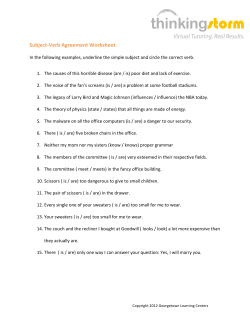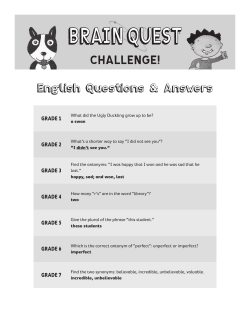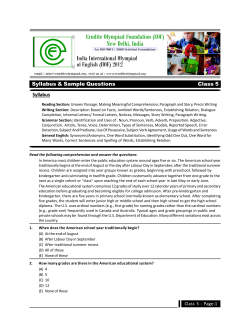
SUBJECT-VERB AGREEMENT
SUBJECT-VERB AGREEMENT Most native English speakers know the standard verb-subject combinations by ear. Examples of these combinations are he talks, not he talk and she has, not she have. However, if you don’t trust your ear or you find simple sentence formations confusing, just follow these simple rules and you will be ready to write flawless sentences in no time! In the present tense, verbs agree with their subjects in NUMBER (singular/plural) and in PERSON (first, second, or third). The present tense ending –s (or –es) is used on a verb if the subject is THIRD PERSON SINGULAR. Otherwise, the verb takes NO ENDING. SINGULAR PLURAL First Person I love We love Second Person You love you love Third Person He/she/it loves They love If the concept still confuses you, try answering the following questions to understand when to use the –s (or –es) form of a present tense verb. Is the verb’s subject he, she, it or one? YES Use –s form (loves, tries, has) NO Is the subject a singular noun (such as parent)? YES Use –s form NO Is the subject a singular indefinite noun – anybody, anyone, each, either, everybody, everyone, everything, neither, no one, someone, or something? YES Use –s form NO Use the base form of the verb (love, try, have) From Hacker, D. (2006). The Bedford handbook (7th ed.). Boston: Bedford/ St. Martins. After learning the basic fundamentals of subject-verb agreement, read and understand these special rules and after some practice, forming correct sentences will be easy! 1. Make the verb agree with its subject, not with the word in between High levels of pollution cause damage to the respiratory tract The subject is levels, NOT pollution 2. With subjects joined with or, nor, either…or, or neither… nor, make the verb agree with the part of the subject NEARER to the verb A driver’s license or credit card is required See, the term “driver’s license” was not used in making the verb agree the sentence. Instead it was the term “credit card” Neither the lab assistant nor the students were able to download the information 3. Treat most indefinite pronouns as SINGULAR Anybody Anyone Anything Each Either Everybody Everyone Everything Neither Nobody No one Nothing Somebody Someone Something Everybody who signed up for the snowboarding trip was taking lessons Everyone on the team supports the coach 4. However, a few indefinite nouns such as ALL, ANY, NONE and SOME may be singular or plural DEPENDING on the noun or pronoun they refer to. Some of our luggage was lost None of his advice makes sense 5. Make the verb agree with its subject even when the subject follows the verb There are surprisingly few children in our neighbourhood There were a social worker and a crew of twenty volunteers at the scene of the accident 6. Words such as athletics, economics, measles and news are usually SINGULAR, despite their plural form Statistics is among the most difficult courses in our program 7. Titles of works, company names, words mentioned as words, and gerund phrases are SINGULAR Lost Cities describes the discoveries of many ancient civilizations Delmonico Brothers specializes in organic produce and additive-free meats. 8. Treat collective nouns (e.g. team, audience, crowd, class, family) as SINGULAR unless the meaning is clearly plural 1. SINGULAR Collective nouns nearly always emphasize a group as a UNIT The class respects the teacher The board of trustees meets in Denver twice a year 2. PLURAL Occasionally, a collective noun is treated as plural to draw attention to the INDIVIDUAL members of the group The class are debating amongst themselves If that is the case, it is better to change it to: The class members are debating amongst themselves Now try answering these exercises to measure how much you learned! EXERCISE 1 Underline the subject (or compound subject) and then identify the verb that agrees with it. Everyone in the telecom focus group (has/have) experienced problems with cell phones 1. Your friendship over the years and your support (has/have) meant a great deal to us. 2. Hamilton Family Center, a shelter for teenage runaways in San Francisco, (offers/offer) a wide variety of services. 3. The main source of income for Trinidad (is/are) oil and pitch. 4. The chances of your being promoted (is/are) excellent. 5. There (was/were) a Pokémon card stuck to the refrigerator. 6. Neither the professor nor his assistants (was/were) able to solve the mystery of the eerie glow in the laboratory. 7. Many hours at the driving range (has/have) led us to design golf balls with GPS locators in them. 8. Discovered in the soil of our city garden (was/were) a button dating from the Civil War dating from the turn of the century. 9. Every year, during the midsummer festival, the smoke of village bonfires (fills/fill) the sky. 10. The story performers (was/were) surrounded by children and adults eager to see magical tales. EXERCISE 2 Edit the following sentences to eliminate problems with subject-verb agreement and write the edited sentence. If a sentence is correct, write “correct.” Jack’s first days in the infantry was gruelling Jack’s first days in the infantry were gruelling 1. One of the main reasons for elephant poaching are the profits received from selling the ivory tusks. 2. Not until my interview with Dr. Chang were other possibilities opened to me. 3. Batik cloth from Bali, blue and white ceramics from Cambodia, and a bocce ball from Turin has made Hannah’s room the talk of the dorm. 4. The board of directors, ignoring the wishes of the neighbourhood, has voted to allow further development. 5. Measles is a contagious childhood disease. 6. The presence of certain bacteria in our bodies are one of the factors that determines our overall health. 7. Leah is the only one of the many applicants who has the ability to step into this job. 8. Neither the explorer nor his companions was ever seen again. ANSWER KEY- Exercise 1 1. Your friendship over the years and your support (has/have) meant a great deal to us. 2. Hamilton Family Center, a shelter for teenage runaways in San Francisco, (offers/offer) a wide variety of services. 3. The main source of income for Trinidad (is/are) oil and pitch. 4. The chances of your being promoted (is/are) excellent. 5. There (was/were) a Pokémon card stuck to the refrigerator. 6. Neither the professor nor his assistants (was/were) able to solve the mystery of the eerie glow in the laboratory. 7. Many hours at the driving range (has/have) led us to design golf balls with GPS locators in them. 8. Discovered in the soil of our city garden (was/were) a button dating from the Civil War dating from the turn of the century. 9. Every year, during the midsummer festival, the smoke of village bonfires (fills/fill) the sky. 10. The story performers (was/were) surrounded by children and adults eager to see magical tales. ANSWER KEY- Exercise 2 1. One of the main reasons for elephant poaching is the profits received from selling the ivory tusks. 2. CORRECT 3. Batik cloth from Bali, blue and white ceramics from Cambodia, and a bocce ball from Turin have made Hannah’s rooms the talk of the dorm. 4. CORRECT 5. CORRECT 6. The presence of certain bacteria in our bodies is one of the factors that determine our overall health. 7. CORRECT 8. Neither the explorer nor his companions were ever seen again. Information and exercises from: Hacker, D. (2006). The Bedford handbook (7th ed.). Boston: Bedford/ St. Martins.
© Copyright 2025





















